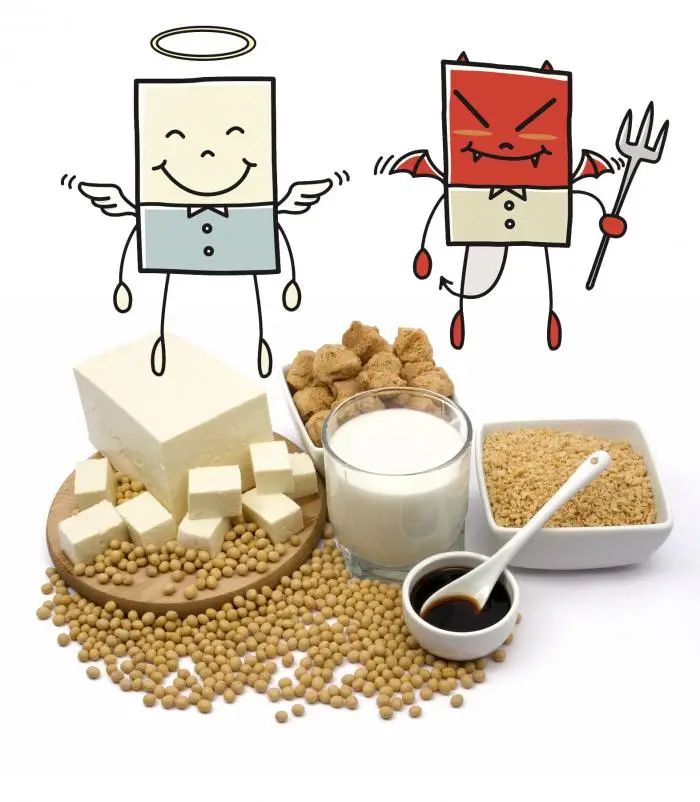Soy is often celebrated for its high-quality plant protein and heart-friendly benefits. But for parents raising daughters, one common concern keeps popping up: “Can soy trigger early puberty in girls?” Let’s take a deep breath and explore what modern science and Ayurvedic wisdom have to say about soy and its impact on growing girls.
🍽️ Forms in Which Soy Is Consumed and When to Start
Soy is available in many forms — some are minimally processed, while others are industrially refined. Common forms include:
- Tofu (bean curd)
- Soy milk (unsweetened or fortified)
- Tempeh (fermented soy)
- Edamame (boiled green soybeans)
- Soy flour, soy chunks, soy protein isolates (used in processed foods)
Soy can typically be introduced around 1 year of age in small amounts, especially if the child is not allergic and digestion is strong. It’s best to start with soft tofu or diluted, unsweetened soy milk occasionally.
🤔 Why the Concern?
Soy contains phytoestrogens — natural compounds called isoflavones that can mimic estrogen in the body (though much more weakly).
This has raised questions like:
- Can soy alter hormonal balance in children?
- Will tofu or soy milk lead to early breast development?
- Should soy be avoided altogether during childhood?
The biggest concern parents have is that soy products may lead to early puberty onset in their children. Early puberty onset is recognized as an established risk factor for all-cause mortality, hormone-related cancers, insulin resistance and obesity later in life. Thus, factors influencing puberty timing have been increasingly acknowledged
🔬 What the Science Really Says
✅ No Clear Link to Early Puberty in Large Reviews
Most research shows no strong association between moderate soy intake and precocious puberty.
- A systematic review and meta-analysis in Plos One (2021) concluded no association between a soy-based infant diet and the onset of puberty in boys or girls.
- A study found that children fed soy protein formula (SPF) for over 6 months had no signs of early puberty or abnormal bone development. Their hormonal and metabolic markers remained within normal ranges, suggesting no estrogen-like effects from long-term SPF use.
- A study found that consuming a soy protein supplement (SPS) for 12 months did not affect puberty onset or sexual maturation in prepubertal children. However, girls who consumed SPS showed increased growth parameters like height, weight, and BMI, possibly linked to fat-free mass gain.
⚠️ Some Studies Do Report a Link Between Soy Consumption & Precocious Puberty
- A study found that girls who were exclusively breastfed for more than 6 months had a lower risk of early puberty (CPP). In contrast, higher soy intake was linked to a greater (3 times higher) risk of early puberty. The longer the soy was consumed, the more it correlated with advanced bone development.
- An animal study has concluded that although animals supplemented with soy at the prepubertal stage displayed a good growth performance, regular soy consumption may promote the development and progress of endometriosis in adulthood, especially when soy content in food is more than 10%.
However, such data may be skewed and non-representative of the population in general.
We can say that while moderate intake is safe, daily high-dose soy supplements, processed soy snacks, or soy protein powders may not be suitable for growing children.
Safe rule: 1 portion a day is fine. Avoid excess or ultra-processed soy products.
🧐 How Much Soy Is Safe?
- ☑️ 1/2 cup tofu or tempeh
- ☑️ 1 cup plain soy milk (organic, unsweetened)
- ☑️ 1–2 servings/week of soy-based snacks (edamame, soya dosa, etc.)
Choose whole or minimally processed soy, and make sure the rest of the diet is diverse and nutrient-rich.
🌿 Ayurvedic Perspective on Soy
Ayurveda doesn’t traditionally include soy in its texts, but if viewed through the lens of Ayurvedic principles:
- Soy is guru (heavy) and can be kapha-increasing, especially when cold, processed, or overused.
- It may be tamasic if old, fermented, or poorly digested.
- Children with low digestive fire (manda agni) may not digest soy well.
Ayurveda recommends focusing on easily digestible proteins like:
- Moong dal
- Masoor dal
- Paneer
- Seasonal vegetables with ghee
Still, fresh, soft tofu in moderation can be introduced for variety — especially if the child is vegetarian or allergic to dairy.
🔧 Practical Tips for Parents
- ✅ Choose organic, non-GMO soy sources
- ✅ Avoid flavored, fried, or sweetened soy drinks and snacks
- ✅ Don’t rely on soy as the primary protein daily
- ✅ Watch your child’s digestion — bloating or flatulence may be signs of poor tolerance
- ✅ Focus on a whole-food, seasonal, and satvik diet for hormonal balance
🥗 Alternatives to Soy
For parents who are concerned or whose child doesn’t tolerate soy well, good alternatives include:
- Moong dal, masoor dal (gentle on digestion)
- Homemade paneer (if dairy is tolerated)
- Chickpeas (well-cooked)
- Quinoa, amaranth, and millet
- Nuts and seeds like almond butter or pumpkin seeds (age-appropriate and in small amounts)
Always prioritize a diverse, fresh, and seasonal diet to support balanced growth and hormone regulation.
🌟 Final Takeaway
Soy doesn’t need to be feared — it just needs to be understood.
Moderate soy intake from whole sources like tofu or unsweetened soy milk is safe for girls. It does not cause early puberty when used mindfully. As always, balance is key. Pair it with clean, colourful, and diverse meals, and you’ll be doing just fine. ✨🫖
📖 References:
- Day FR, Thompson DJ, Helgason H, Chasman DI, et al . Genomic analyses identify hundreds of variants associated with age at menarche and support a role for puberty timing in cancer risk. Nat Genet. 2017 Jun;49(6):834-841. doi: 10.1038/ng.3841. Epub 2017 Apr 24. PMID: 28436984; PMCID: PMC5841952.
- Oliveira FRK, Gustavo AFSE, Gonçalves RB, Bolfi F, Mendes AL, Nunes-Nogueira VDS. Association between a soy-based infant diet and the onset of puberty: A systematic review and meta-analysis. PLoS One. 2021 May 18;16(5):e0251241. doi: 10.1371/journal.pone.0251241. PMID: 34003856; PMCID: PMC8130953.
- Felício JS, de Alcântara AL, Janaú LC, de Moraes LV, de Oliveira MCNI, de Lemos MN, de Souza Neto NJK, Neto JFA, da Silva WM, de Souza ÍJA, Said NM, de Lemos GN, Vieira GM, Khayat AS, Dos Santos ÂKCR, de Queiroz NNM, de Sousa ACCB, Dos Santos MC, de Melo FTC, Piani PPF, Felício KM. Association of Soy and Exclusive Breastfeeding With Central Precocious Puberty: A Case-Control Study. Front Endocrinol (Lausanne). 2021 Jul 5;12:667029. doi: 10.3389/fendo.2021.667029. PMID: 34290667; PMCID: PMC8287825.
- Duitama SM, Zurita J, Cordoba D, Duran P, Ilag L, Mejia W. Soy protein supplement intake for 12 months has no effect on sexual maturation and may improve nutritional status in pre-pubertal children. J Paediatr Child Health. 2018 Sep;54(9):997-1004. doi: 10.1111/jpc.13934. Epub 2018 May 20. PMID: 29779250.
- Giampietro PG, Bruno G, Furcolo G, Casati A, Brunetti E, Spadoni GL, Galli E. Soy protein formulas in children: no hormonal effects in long-term feeding. J Pediatr Endocrinol Metab. 2004 Feb;17(2):191-6. doi: 10.1515/jpem.2004.17.2.191. PMID: 15055353.
- Mvondo MA, Ekenfack JD, Minko Essono S, Saah Namekong H, Awounfack CF, Laschke MW, Njamen D. Soy Intake Since the Prepubertal Age May Contribute to the Pathogenesis of Endometriosis in Adulthood. J Med Food. 2019 Jun;22(6):631-638. doi: 10.1089/jmf.2018.0160. Epub 2019 Mar 13. PMID: 30864871.

Akanksha Sharma
Dr. Akanksha Sharma, Head Writer and creator of AtoZ of Pregnancy, is dedicated to empowering women, parents, and families through 360-degree knowledge. She and her team provide evidence-based advice to guide families through pregnancy, parenting and beyond.






